Business Negotiation商务英语谈判重点
商务英语negotiation
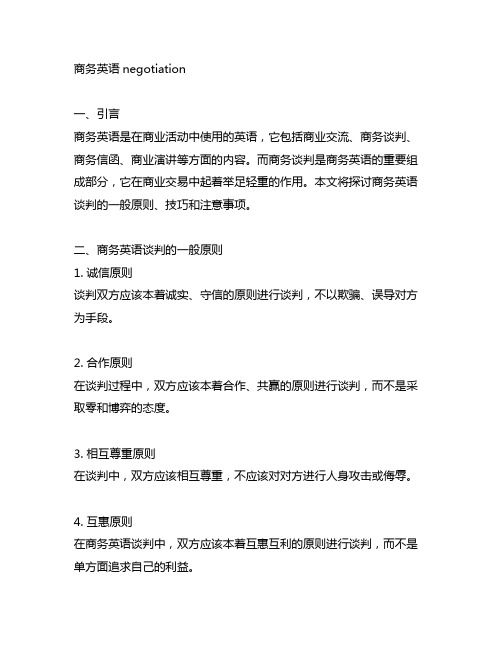
商务英语negotiation一、引言商务英语是在商业活动中使用的英语,它包括商业交流、商务谈判、商务信函、商业演讲等方面的内容。
而商务谈判是商务英语的重要组成部分,它在商业交易中起着举足轻重的作用。
本文将探讨商务英语谈判的一般原则、技巧和注意事项。
二、商务英语谈判的一般原则1. 诚信原则谈判双方应该本着诚实、守信的原则进行谈判,不以欺骗、误导对方为手段。
2. 合作原则在谈判过程中,双方应该本着合作、共赢的原则进行谈判,而不是采取零和博弈的态度。
3. 相互尊重原则在谈判中,双方应该相互尊重,不应该对对方进行人身攻击或侮辱。
4. 互惠原则在商务英语谈判中,双方应该本着互惠互利的原则进行谈判,而不是单方面追求自己的利益。
5. 灵活原则在商务英语谈判中,双方应该本着灵活应变的原则进行谈判,根据实际情况做出相应调整。
6. 求同存异原则在谈判中,双方应该注重求同存异,找到双方共同的利益点,同时尊重对方的差异。
三、商务英语谈判的技巧1. 语言表达技巧在商务英语谈判中,双方应该注意语言的表达技巧,用词准确、表达清晰,避免产生歧义。
2. 逻辑思维技巧在商务英语谈判中,双方应该善于运用逻辑思维,寻找问题的根源,找出解决问题的方法。
3. 沟通技巧在商务英语谈判中,双方应该善于沟通,倾听对方的意见,及时反馈自己的想法,避免双方产生误解。
4. 调控情绪技巧在商务英语谈判中,双方应该注意调控情绪,避免因情绪强烈而导致谈判破裂。
5. 听取建议技巧在商务英语谈判中,双方应该善于听取对方的建议,做出有效回应,寻找双方都能接受的方案。
6. 技术谈判技巧在商务英语谈判中,双方应该善于运用技术手段,比如数据分析、市场调研等,为谈判提供有力支持。
四、商务英语谈判的注意事项1. 准备充分在进入商务英语谈判前,双方都应该对谈判的内容、目标作出充分准备,以应对各种可能的情况。
2. 注意谈判场地商务英语谈判应该选择一个合适的场地,保证谈判的顺利进行。
商务谈判技巧(businessnegotiation)

1
非语言沟通
注意肢体语言和面部表情的影响
Байду номын сангаас
2
跨文化沟通
尊重他人文化差异,避免误解
解决冲突和妥协技巧
1 寻求共同利益
寻找解决方案中的共同点
2 灵活妥协
做出必要的让步,以达成协议
成功谈判的要点
目标明确
设定明确的目标和期望结果
合作态度
以合作为导向,创造双赢机会
问题解决能力
善于找出解决方案,并执行
总结
准备充分
目标设定和信息收集的重要性
灵活应变
根据不同情况选择合适的策 略和技巧
追求双赢
寻找共同利益,达成满意的 协议
商务谈判技巧
商务谈判的定义和重要性
准备阶段
目标设定
明确谈判目标,确定最优结果
信息收集
收集对方信息,了解其需求和利益
谈判策略
1
竞争策略
通过争取优势,争取更多的资源和利益
合作策略
2
积极合作,达成双赢的协议
谈判技巧
倾听和理解对方
有效倾听,理解对方需求和利益
提出有效论证
使用事实和数据支持自己的观点
沟通技巧
Negotiations国际商务谈判考试重点

Negotiations: a process of communication between parties to manage conflicts in order for them to come to an agreement ,solve a problem or make arrangements. Conflicts: a dispute, disagreement or argument between two or more interdependent parties whodifferent and common interestes.Stakes: the value of benefits that may be gained or lost, and the costs that may be incurred or avoided.Negotiation procedure: 1.introduction of team members 2.negotiation agenda and its arrangement 3. formal negotiation 4. wrapping up.General structure of negotiation:1.determine interests and issues 2.design and offer options 3.introduce criteria to evaluate options 4.estimate reservation points 5.explore alternatives to agreement 6.reach an agreementThe reservation points means the target that negotiators have to achive for assurance of their basic interests.BATNA( best alternative to a negotiated agreement )refers to your last choice between conditions of the other side and the opportunity for other better results.Structure of business negotiations: 1.inquire 2.offer 3.counteroffer 4.acceptanceNegotiation teams: team leaders/professionals/ interpreters/notekeeper/other suggestions for teammembers主谈判人员作用:strong-background knowledge,effective-team spirit,authoritative-decision making(shrewdness, patience, endurance, adaptability, sociable, personal characteristic)谈判地点选择:host venue[enjoying good timing,familiarsurrounding,ready help] guest venue[on spot survey and collecting first hand information] third party’s venue[used when there is no talking channel and for consideration of fairness或者①the two negotiating parties are hostile and antagonistic to each other, or even engaged in a fighting against each other②when a negotiation goes into an impasse and there is no sign of rapprochement③both parties demand strongly to host the negotiation]3C: character/capacity/capitalWin-win concept:(traditional concept)How can both sides win:.hidden agendaCPN(collaborative principled negotiation)合作原则谈判法: to reach a solution beneficial to both parties by way of stressing interests and value not by way of haggling.CPN4个原则①people: separate the people from the problem②interests: focus on intereste not positions③gaining: invent options for mutual gain④criteria: introduce objective criteria Introduce objective criteria客观评判标准: Fair procedures: coin flips/cut and choose/ taking turns/ inherent fairnessLaw of interest distribution利益分配法则: Needs theory(interests of individual negotiators,organization,states Law of two-level game:(International level-(level I)represented by countries, international organizations,enterprises,etc; Domestic level-(level II)represent by government institutions, interest groups,coalition,etc.){how both domestic and international variables interact with each other and jointly influence the result of binational negotiations and thus reveals the law of two level games.}Sources of negotiation power: the state of market /market share/information /time /corporate size and structure/product life cycleHow to decide a person trust or is tursted:1.unchangeable elements[childhood education/professional or special training] 2.changeable elements[past credit record/competence of others to perform a task/intentions of others/reward system]Divides personal styles into five modes:competing/collaborating/compromising/avoiding/accommodati ngFactors causing the change of negotiation power: motivation/denpendence/substitutesPower tactics:time pressure/appearing firm/ridiculing other’s position/building prominence of your offer/threatening the relationshipP(A~B)=M B*D B:A/S B--M A*D A:B/S AP(A~B):{A’s power relative to B(A=self,B=other)}; M B: {B’s motivation for the goals mediated by A}; M A: {A’s motivation for the goals mediated by B}; D B:A:{B’s dependence on A to get the goals}; D A:B:{A’s dependence on B to get the goals}; S B:{B’s substitutes or alternatives satisfying those goals} S A{ A’s substitutes or alternatives satisfying those goals }Negotiations: a process of communication between parties tomanage conflicts in order for them to come to anagreement ,solve a problem or make arrangements.Conflicts: a dispute, disagreement or argument between two ormore interdependent parties whodifferent and common interestes.Stakes: the value of benefits that may be gained or lost, and thecosts that may be incurred or avoided.Negotiation procedure: 1.introduction of team members2.negotiation agenda and its arrangement3. formal negotiation4. wrapping up.General structure of negotiation:1.determine interests andissues 2.design and offer options 3.introduce criteria to evaluateoptions 4.estimate reservation points 5.explore alternatives toagreement 6.reach an agreementThe reservation points means the target that negotiators haveto achive for assurance of their basic interests.BATNA( best alternative to a negotiated agreement )refers toyour last choice between conditions of the other side and theopportunity for other better results.Structure of business negotiations: 1.inquire 2.offer3.counteroffer4.acceptanceNegotiation teams: team leaders/professionals/interpreters/notekeeper/other suggestions for teammembers主谈判人员作用:strong-background knowledge,effective-teamspirit,authoritative-decision making(shrewdness, patience,endurance, adaptability, sociable, personal characteristic)谈判地点选择:host venue[enjoying goodtiming,familiarsurrounding,ready help] guest venue[on spotsurvey and collecting first hand information] third party’svenue[used when there is no talking channel and forconsideration of fairness或者①the two negotiating parties arehostile and antagonistic to each other, or even engaged in afighting against each other②when a negotiation goes into animpasse and there is no sign of rapprochement③both partiesdemand strongly to host the negotiation]3C: character/capacity/capitalWin-win concept:(traditional concept)How can both sideswin:.hidden agendaCPN(collaborative principled negotiation)合作原则谈判法:to reach a solution beneficial to both parties by way of stressinginterests and value not by way of haggling.CPN4个原则①people: separate the people from the problem②interests: focus on intereste not positions③gaining: inventoptions for mutual gain④criteria: introduce objective criteriaIntroduce objective criteria客观评判标准: Fair procedures: coin flips/cut and choose/taking turns/ inherent fairnessLaw of interest distribution利益分配法则: Needstheory(interests of individual negotiators,organization,statesLaw of two-level game:(International level-(levelI)represented by countries, internationalorganizations,enterprises,etc; Domestic level-(level II)representby government institutions, interest groups,coalition,etc.){howboth domestic and international variables interact with eachother and jointly influence the result of binational negotiationsand thus reveals the law of two level games.}Sources of negotiation power: the state of market /marketshare/information /time /corporate size and structure/productlife cycleHow to decide a person trust or is tursted:1.unchangeableelements[childhood education/professional or special training]2.changeable elements[past credit record/competence of othersto perform a task/intentions of others/reward system]Divides personal styles into five modes:competing/collaborating/compromising/avoiding/accommodatingFactors causing the change of negotiation power:motivation/denpendence/substitutesPower tactics:time pressure/appearing firm/ridiculing other’sposition/building prominence of your offer/threatening therelationshipP(A~B)=M B*D B:A/S B--M A*D A:B/S AP(A~B):{A’s power relative to B(A=self,B=other)};M B: {B’s motivation for the goals mediated by A}; M A:{A’s motivation for the goals mediated by B}; D B:A:{B’sdependence on A to get the goals}; D A:B:{A’s dependenceon B to get the goals}; S B:{B’s substitutes or alternativessatisfying those goals} S A{ A’s substitutes or alternativessatisfying those goals }Negotiations: a process of communication between parties tomanage conflicts in order for them to come to anagreement ,solve a problem or make arrangements.Conflicts: a dispute, disagreement or argument between two ormore interdependent parties whodifferent and common interestes.Stakes: the value of benefits that may be gained or lost, and thecosts that may be incurred or avoided.Negotiation procedure: 1.introduction of team members2.negotiation agenda and its arrangement3. formal negotiation4. wrapping up.General structure of negotiation:1.determine interests andissues 2.design and offer options 3.introduce criteria to evaluateoptions 4.estimate reservation points 5.explore alternatives toagreement 6.reach an agreementThe reservation points means the target that negotiators haveto achive for assurance of their basic interests.BATNA( best alternative to a negotiated agreement )refers toyour last choice between conditions of the other side and theopportunity for other better results.Structure of business negotiations: 1.inquire 2.offer3.counteroffer4.acceptanceNegotiation teams: team leaders/professionals/interpreters/notekeeper/other suggestions for teammembers主谈判人员作用:strong-background knowledge,effective-teamspirit,authoritative-decision making(shrewdness, patience,endurance, adaptability, sociable, personal characteristic)谈判地点选择:host venue[enjoying goodtiming,familiarsurrounding,ready help] guest venue[on spotsurvey and collecting first hand information] third party’svenue[used when there is no talking channel and forconsideration of fairness或者①the two negotiating parties arehostile and antagonistic to each other, or even engaged in afighting against each other②when a negotiation goes into animpasse and there is no sign of rapprochement③both partiesdemand strongly to host the negotiation]3C: character/capacity/capitalWin-win concept:(traditional concept)How can both sideswin:.hidden agendaCPN(collaborative principled negotiation)合作原则谈判法:to reach a solution beneficial to both parties by way of stressinginterests and value not by way of haggling.CPN4个原则①people: separate the people from the problem②interests: focus on intereste not positions③gaining: inventoptions for mutual gain④criteria: introduce objective criteriaIntroduce objective criteria客观评判标准: Fair procedures: coin flips/cut and choose/taking turns/ inherent fairnessLaw of interest distribution利益分配法则: Needstheory(interests of individual negotiators,organization,statesLaw of two-level game:(International level-(levelI)represented by countries, internationalorganizations,enterprises,etc; Domestic level-(level II)representby government institutions, interest groups,coalition,etc.){howboth domestic and international variables interact with eachother and jointly influence the result of binational negotiationsand thus reveals the law of two level games.}Sources of negotiation power: the state of market /marketshare/information /time /corporate size and structure/productlife cycleHow to decide a person trust or is tursted:1.unchangeableelements[childhood education/professional or special training]2.changeable elements[past credit record/competence of othersto perform a task/intentions of others/reward system]Divides personal styles into five modes:competing/collaborating/compromising/avoiding/accommodatingFactors causing the change of negotiation power:motivation/denpendence/substitutesPower tactics:time pressure/appearing firm/ridiculing other’sposition/building prominence of your offer/threatening therelationshipP(A~B)=M B*D B:A/S B--M A*D A:B/S AP(A~B):{A’s power relative to B(A=self,B=other)};M B: {B’s motivation for the goals mediated by A}; M A:{A’s motivation for the goals mediated by B}; D B:A:{B’sdependence on A to get the goals}; D A:B:{A’s dependenceon B to get the goals}; S B:{B’s substitutes or alternativessatisfying those goals} S A{ A’s substitutes or alternativessatisfying those goals }。
business negotiation 商务英语谈判
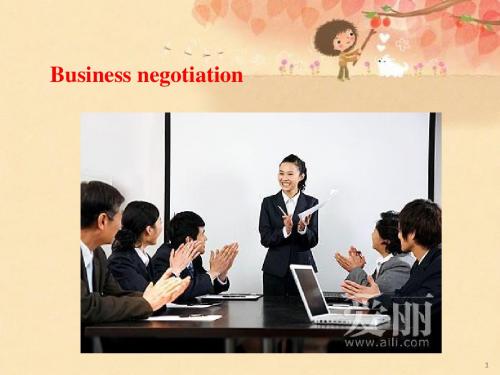
Do you think there is something wrong with the contract? • 你认为合同有问题吗?
We'd like you to consider our request once again. • 我们希望贵方再次考虑我们的要求。
We'd like to clear up some points connected with the technical part of the contract. • 我们希望搞清楚有关合同中技术方面的几 个问题。
• 如果您把质量考虑进去的话,您会发现我 方价格是合理的。
We guarantee quality products which can stand fierce competition. • 我们保证提供能经得起激烈竞争的高质量 产品。
I still have some questions concerning our contract. • 就合同方面我还有些问题要问。
不同商品需要不同的包装。
• Different articles require different forms of packing.
包装费用未算在报价中。
• Packing charges are excluded in the quoted prices.
• The end !
我们将按合同条款交货。
• We'll ship our goods in accordance with the terms of the contract.
我们确信合同会顺利执行的。
• We are sure the contract can be carried out smoothly.
商务英语谈判教材
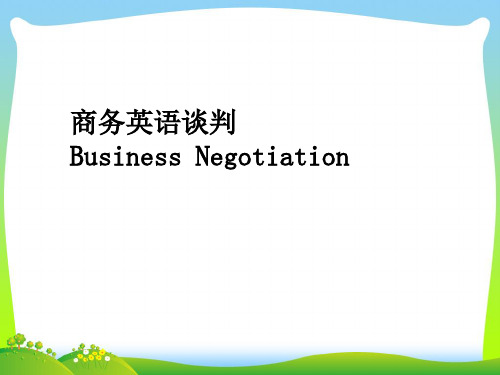
Let’s meet each other half way.
那我们各让一步吧。
Usually an offer will include the following:
1. name of the goods. 2.quality and specifications. 3. quantity. 4.details of prices. 5. discount. 6. terms of payment. 7. time of shipment. 8. packing
may include: price、 specifications 、 quality 、 packing 、 delivery time 、 payment terms etc.
贸易谈判口译
1. 询盘(inquiry) 在这个环节中经常用的句子有:
Can I make an inquiry? / Could you give us some ideas about your prices? / Will you please inform us of the prices at which you can offer the goods? / I hope to have your quotation for …?
A counter—offer is made when the prospective buyers find any terms and conditions in the offer unacceptable.
Sometimes buyers may take the initiative to make a bid to sellers. If the bid is not acceptable to the sellers, a counter—bid will be made subsequently.
商务谈判英语
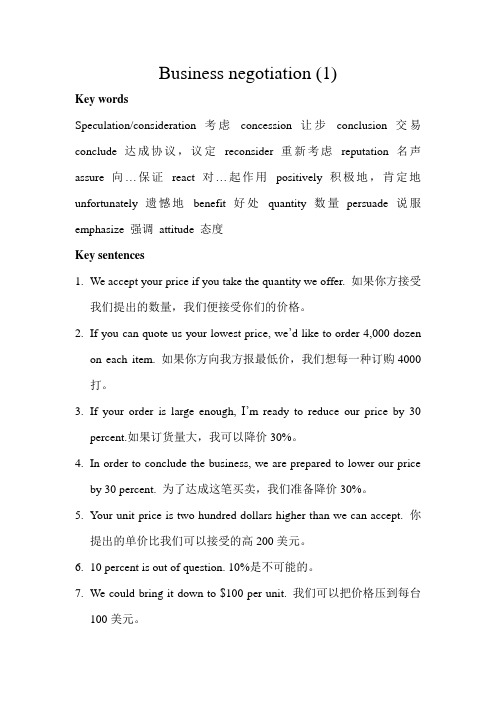
Business negotiation (1)Key wordsSpeculation/consideration 考虑concession 让步conclusion 交易conclude 达成协议,议定reconsider 重新考虑reputation 名声assure 向…保证react对…起作用positively积极地,肯定地unfortunately遗憾地benefit 好处quantity 数量persuade 说服emphasize 强调attitude 态度Key sentences1.We accept your price if you take the quantity we offer. 如果你方接受我们提出的数量,我们便接受你们的价格。
2.If you can quote us your lowest price, we’d like to order 4,000 dozenon each item. 如果你方向我方报最低价,我们想每一种订购4000打。
3.If your order is large enough, I’m ready to reduce our price by 30percent.如果订货量大,我可以降价30%。
4.In order to conclude the business, we are prepared to lower our priceby 30 percent. 为了达成这笔买卖,我们准备降价30%。
5.Your unit price is two hundred dollars higher than we can accept. 你提出的单价比我们可以接受的高200美元。
6.10 percent is out of question. 10%是不可能的。
7.We could bring it down to $100 per unit. 我们可以把价格压到每台100美元。
Business Negotiation(商务谈判)

Step 2 – Give reasons. 给原因
☺We can’t sell your products at all at that price.
这么高的进货价格,会导致我们的产品滞销。
☺We can’t make any profit at that price. 这么高的价格,我们将没有任何盈利的空间。
English Training
Topic
Business Negotiation 商务谈判
What will we talk about on a business negotiation? 商务谈判谈什么?
☺Price: 价格
high/ low
☺Shipment: 出货方式
by air/ sea/ railway/ road/ containerization
☺Our products are well received all over the world.
As an exporter 作为出口商
Step 1 – Express the view on price
☺Our price is very low/ attractive/ competitive/ acceptable/ practical/ workable/ on the low side/ reasonable.
☺ The price is very high/not attractive/not competitive/not acceptable/ impractical/unworkable/ on the high side. 这价格太高/没有吸引力/没有竞争力/无法接受/不切实 际/不行。 ☺ I’m afraid the price is too high to be acceptable/attractive. 我恐怕这价格太高了,我无法接受/对我没有任何吸引 力。
BusinessNegotiation商务谈判词汇

BusinessNegotiation商务谈判词汇Business Negotiation商务谈判词汇询价 make an inquiry报价 quotation报/发盘 offer底盘 floor offer实/虚盘 firm/non-firm offer开/收盘 opening/closing price现/期货价 spot/forward price还盘 counter-offer回佣 return commission到岸价 C.I.F.(即Cost, Insurance and Freight)到岸加佣金价 C.I.F.C.(即Cost, Insurance, Freight and Commission)现货 spot goods库存有限 limited stock批发价 wholesale price零售价 retail price净利润 net profit定金 down payment分期付款 payment by installment现金结算 cash settlement信用证结算 payment by letter of credit(L/C)股东 shareholder; stockholder我方 on our part双赢战略 win-win strategy中止合同 terminate the contract提出索赔 lodge a claim要求赔偿损失 claim for a compensation of the loss/damage贸易索赔 business claim补偿贸易 compenstion trade第二部分词语扩展商品交易会 Commodities Fair经营范围 line/scope of business独家经销代理 exclusive selling agency市场准入 market access机床 machine tools汽车零部件 auto parts电子商务 e-commerce; e-business第三部分例句请给我一个有效期为90天的.C.I.F.报价,目的港为洛杉矶,报价含5%的佣金,,I'd like to hear your quotation on a C.I.F.Los Angeles basis valid for 90 days, with an inclusion of 5% angent's commission in your quotation.。
商务谈判BusinessNegotiationPPT学习教案
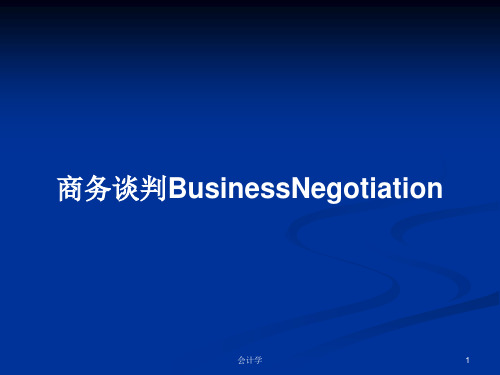
第5页/共13页
3.进行清晰的沟通
首先,要认真听取对方的谈话
如偶尔插话:“对不起,你的意思是?”
其次,谈判者要注意谈论自己的感受
如“你不遵守诺言” 望”
“我感到很失
“你以强欺弱”
“我觉得受到歧视”
第三,发言要有目的性
第6页/共13页
第三节 意愿与客观标准
一.意愿不能成为谈判的基础 二.提出并使用客观标准
客观标准要独立于各方主观意志之外, 在理论上至少适用双方,而且还应合法和切 合实际。
三.如何运用客观标准
1.
第四节 谈判的其他原则
言而有信 留有余地 少讲多听
o 倾听时要专注 o 要搞清语言中的真正含义 o 不应以貌取人 o 不可半路中断倾听 o 不可疏忽大意或不懂装懂 o 边倾听,边思考如何回答
第1页/共13页
三. 协调谈判双方的利益
1.站在对方的立场上考虑问题 2.要考虑双方的多重利益 3.要特别注意别人的基本要求
人的基本需要包括:安全感、良好的 经济状况、归属感、被人承认和要主宰 自己的命运。
4.提出双方得益的方案
第2页/共13页
第二节 个人与问题
一.把人与问题分开
要处理好“对事不对人” 或“对人不对事”的辨证 关系。 “事”指具体的行为、事件,“人”指
2. 把人与事分开,对事不对人 3. 意愿不能成为谈判的依据,必须要提
出并使用客观标准,做到公正公平 4. 在具体谈判过程中应遵循六项技术性
谈判原则 5. 整体谈判的10项系统要领
第12页/共13页
第8页/共13页
•不使自己处于讨价还价的境地 •要保持与对方愿望的联系 •要致力于解决问题,不一味抱怨
商务英语常用词汇交易磋商合同签订
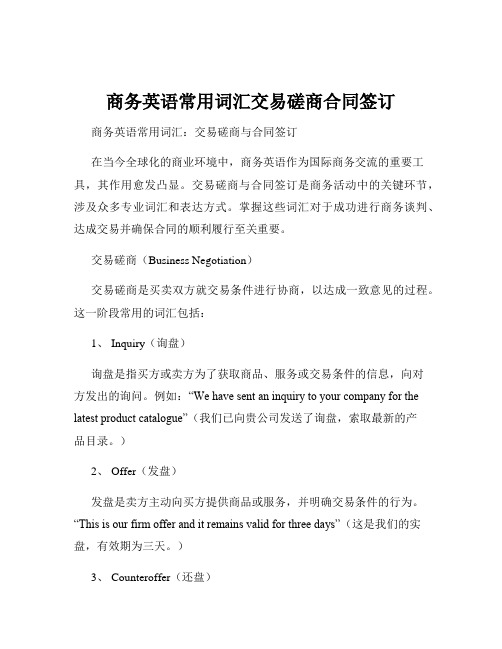
商务英语常用词汇交易磋商合同签订商务英语常用词汇:交易磋商与合同签订在当今全球化的商业环境中,商务英语作为国际商务交流的重要工具,其作用愈发凸显。
交易磋商与合同签订是商务活动中的关键环节,涉及众多专业词汇和表达方式。
掌握这些词汇对于成功进行商务谈判、达成交易并确保合同的顺利履行至关重要。
交易磋商(Business Negotiation)交易磋商是买卖双方就交易条件进行协商,以达成一致意见的过程。
这一阶段常用的词汇包括:1、 Inquiry(询盘)询盘是指买方或卖方为了获取商品、服务或交易条件的信息,向对方发出的询问。
例如:“We have sent an inquiry to your company for the latest product catalogue”(我们已向贵公司发送了询盘,索取最新的产品目录。
)2、 Offer(发盘)发盘是卖方主动向买方提供商品或服务,并明确交易条件的行为。
“This is our firm offer and it remains valid for three days”(这是我们的实盘,有效期为三天。
)3、 Counteroffer(还盘)当一方对另一方的发盘不完全满意时,提出修改交易条件的回应称为还盘。
“The buyer made a counteroffer, asking for a lower price”(买方还盘,要求更低的价格。
)4、 Quotation(报价)报价是卖方给出的商品或服务的价格及相关交易条件。
“Please provide us with a detailed quotation for the equipment”(请为我们提供该设备的详细报价。
)5、 Specification(规格)规格用于描述商品的具体特征、技术参数等。
“The product must meet the specified requirements in terms of size and performance”(产品必须在尺寸和性能方面符合规定的规格要求。
商务英语常用词汇交易磋商合同签订

商务英语常用词汇交易磋商合同签订商务英语常用词汇:交易磋商与合同签订在当今全球化的商业环境中,商务英语成为了企业间沟通与合作的重要工具。
其中,交易磋商与合同签订环节涉及众多专业词汇,准确理解和运用这些词汇对于成功的商务交易至关重要。
交易磋商(Business Negotiation)是指买卖双方就交易条件进行反复协商,以达成一致的过程。
在这个阶段,以下词汇经常被使用:“Offer”(发盘),指卖方主动向买方提供商品或服务的价格、数量、质量等具体交易条件。
例如:“The supplier made an attractive offer forthe new products”(供应商对新产品给出了有吸引力的发盘。
)“Counteroffer”(还盘),当买方对卖方的发盘不满意时,提出修改后的交易条件。
如:“The buyer made a counteroffer to lower the price”(买方还盘要求降低价格。
)“Enquiry”(询盘),通常是买方询问卖方有关商品或服务的信息。
“We received several enquiries about the latest model of the machine”(我们收到了几个关于最新款机器的询盘。
)“Quotation”(报价),卖方对买方询盘的回复,给出商品或服务的价格。
“The company provided a detailed quotation for the project”(公司为这个项目提供了详细的报价。
)“Specification”(规格),详细说明商品或服务的技术参数、质量标准等。
“The product must meet the specified requirements”(产品必须符合规定的规格要求。
)“Delivery date”(交货日期),双方约定的商品交付时间。
“It's crucial to confirm the delivery date to avoid delays”(确认交货日期以避免延误至关重要。
BusinessNegotiation商务英语谈判重点

BusinessNegotiation商务英语谈判重点重点:1)What is Negotiation?“Negotiation”means “doing business”or a discussion aimed at reaching an agreement.Four main phases of negotiation:①The preparing phase (预备阶段)②The debating phase (争论阶段)③The proposal phase (建议阶段)④The bargaining phase(讨价还价阶段)或者是Pre-NegotiationFace-to-Face Negotiation ( At the Negotiation P.1-3 )Post-Negotiation2)What is business negotiation?Business Negotiation is a kind of discussion aimed at reaching a business agreement or a business contract.Four stages in business negotiation①non-task sounding (开局前的试探)②task-related exchange of information (交换与谈判目标有关的信息)③persuasion (说服)④concessions and agreements (让步与同意)3)Some Issues that Chinese Corporations and Negotiators Need to Address①Chinese businessmen tend to have business negotiations in a rather indirect manner, as opposed to the direct manner of American businessmen.②The decision-making process of Chinese companies is generally both slow and time-consuming. On the other hand,American companies usually operate with quick decision made by the top management.Different Business Communication Styles between China and the USA①Manner: Direct Manner / Indirect Man ner②Decision-Making: Quick, Top-Down / Slow, Tine-Consuming③Work Ethic: Individual Oriented / Social PressureValue Results more than its Process / Community Belonging, Priority to Planning④Merits: Efficiency / Encourage CooperationCompetition in Workers / more Humane⑤Demerits: Frustrating Workers / Lack of Efficiency and Competition4)China’s Foreign Trade PolicyThe principle of China’s foreign trade is “equality, mutual benefit and exchanging what one has for what one needs”.(平等互利,互通有无)5)An Introduction to the Five Links of International Business Negotiation①Enquiry (询盘)②Offer (发盘)③Counter-Offer (还盘)④Acceptance (接受)⑤Conclusion of a Contract(缔结合同)Of course, it is not necessary to have all the five links taken for every transaction. Sometimes, only offer and acceptance will do. It is stipulated in the laws of some countries that only offer and acceptance are the two required factors, failure of which will make no contract.6)Brief Introduction to Incoterms?2010Incoterms are used in international import/export contract to show the responsibility of the buyers and the sellers. They define who is responsible for “freight”or “carriage”(transportation) , insurance against risks, “duty”(tariff) and “clearance”(import and export documentation).The wor d “INCOTERMS”is short for International Rules for the Interpretation of Trade Terms, and most frequently used in international sales transactions.The latest version is INCOTERMS ? 2010, which already became effective on Jan. 1st 2011.Previous versions, including INCOTERMS 2000, are now outdatedThe ? sign means a registered trade mark, it became a necessary part of Incoterms ?2010 7)International Tender or Bid 国际性招投标Concepts Related Tender or Bid on p.147Tender 投标(British English)Bid 投标(American English)submit a tender / bid(submission of tender / bid)投标Tenderer or bidder 投标者Winning bidder / successful tenderer 中标者To invite tender / bid 招标Invitation for (to) tender / Bids 招标Tenderee / the bid inviting party 招标人/ 招标方Generally speaking, people often using tendering / bidding to refer to invite tender / bid and tender / bid.Tendering / Bidding 招投标International tendering / international bidding 国际招投标Submission of Tender (投标)Tenders’/ Bidders’behaviors to deliver their bid / tenders forms to the tenderee according to the conditions of the Tender notice within the specified period of time.投标人根据招标公告或招标单规定的条件,在指定的时间内向招标人递盘的行为。
商务英语谈判时必须掌握11大类词汇
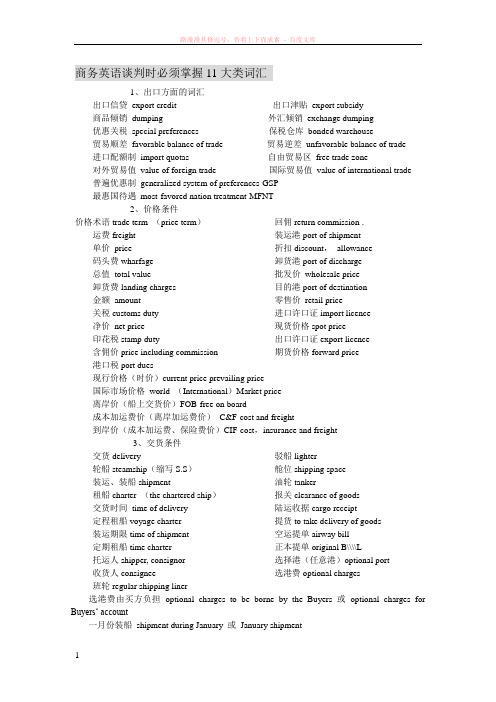
路漫漫其修远兮,吾将上下而求索- 百度文库商务英语谈判时必须掌握11大类词汇-------------------1、出口方面的词汇----------------------出口信贷export credit 出口津贴export subsidy商品倾销dumping 外汇倾销exchange dumping优惠关税special preferences 保税仓库bonded warehouse贸易顺差favorable balance of trade 贸易逆差unfavorable balance of trade 进口配额制import quotas 自由贸易区free trade zone对外贸易值value of foreign trade 国际贸易值value of international trade 普遍优惠制generalized system of preferences-GSP最惠国待遇most-favored nation treatment-MFNT-------------------2、价格条件----------------------价格术语trade term (price term)运费freight单价price码头费wharfage总值total value卸货费landing charges金额amount关税customs duty净价net price印花税stamp duty含佣价price including commission港口税port dues 回佣return commission . 装运港port of shipment折扣discount,allowance 卸货港port of discharge批发价wholesale price目的港port of destination 零售价retail price进口许口证import licence 现货价格spot price出口许口证export licence 期货价格forward price现行价格(时价)current price prevailing price国际市场价格world (International)Market price离岸价(船上交货价)FOB-free on board成本加运费价(离岸加运费价)C&F-cost and freight到岸价(成本加运费、保险费价)CIF-cost,insurance and freight --------------------3、交货条件----------------------交货delivery轮船steamship(缩写S.S)装运、装船shipment租船charter (the chartered ship)交货时间time of delivery定程租船voyage charter装运期限time of shipment定期租船time charter托运人shipper, consignor收货人consignee班轮regular shipping liner 驳船lighter舱位shipping space油轮tanker报关clearance of goods陆运收据cargo receipt提货to take delivery of goods 空运提单airway bill正本提单original B\\\\L选择港(任意港)optional port 选港费optional charges选港费由买方负担optional charges to be borne by the Buyers 或optional charges for Buyers‘ account一月份装船shipment during January 或January shipment一月底装船shipment not later than Jan.31st.或shipment on or before Jan.31st.一/二月份装船shipment during Jan./Feb.或Jan./Feb. shipment在……(时间)分两批装船shipment during……in two lots在……(时间)平均分两批装船shipment during……in two equal lots分三个月装运in three monthly shipments分三个月,每月平均装运in three equal monthly shipments立即装运immediate shipments即期装运prompt shipments收到信用证后30天内装运shipments within 30 days after receipt of L/C允许分批装船partial shipment not allowed partial shipment not permitted partial shipment not unacceptable---------------4、交易磋商、合同签订-----------------订单indent订货;订购book;booking电复cable reply实盘firm offer递盘bid;bidding 递实盘bid firm还盘counter offer发盘(发价)offer发实盘offer firm询盘(询价)inquiry;enquiry---------------5、交易磋商、合同签订-----------------订单indent订货;订购book;booking 电复cable reply实盘firm offer递盘bid;bidding 递实盘bid firm还盘counter offer发盘(发价)offer发实盘offer firm询盘(询价)inquiry;enquiry---------------6、交易磋商、合同签订-----------------指示性价格price indication 速复reply immediately参考价reference price习惯做法usual practice交易磋商business negotiation 不受约束without engagement 业务洽谈business discussion 限**复subject to reply ** 限* *复到subject to reply reaching here ** 有效期限time of validity有效至**:valid till **购货合同purchase contract销售合同sales contract购货确认书purchase confirmation销售确认书sales confirmation一般交易条件general terms and conditions以未售出为准subject to prior sale需经卖方确认subject to seller‘s confirmation需经我方最后确认subject to our final confirmation ------------------7、贸易方式------------------------INT (拍卖auction)寄售consignment招标invitation of tender 投标submission of tender 一般代理人agent总代理人general agent代理协议agency agreement累计佣金accumulative commissio补偿贸易compensation trade (或抵偿贸易)compensating/compensatory trade (又叫:往返贸易)counter trade来料加工processing on giving materials来料装配assembling on provided parts独家经营/专营权exclusive right独家经营/包销/代理协议exclusivity agreement独家代理sole agency;sole agent;exclusive agency;exclusive agent-------------------8、品质条件-----------------------品质quality 原样original sample规格specifications 复样duplicate sample说明description 对等样品countersample标准standard type 参考样品reference sample商品目录catalogue 封样sealed sample宣传小册pamphlet 公差tolerance货号article No. 花色(搭配)assortment样品sample 5% 增减5% plus or minus代表性样品representative sample大路货(良好平均品质)fair average quality--------------------9、商检仲裁-----------------------索赔claim 争议disputes罚金条款penalty 仲裁arbitration不可抗力force Majeure 仲裁庭arbitral tribunal产地证明书certificate of origin 品质检验证书inspection certificate of quanlity 重量检验证书inspection certificate of weight (quantity)**商品检验局**commodity inspection bureau (*.C.I.B)品质、重量检验证书inspection certificate---------------------10、数量条件-----------------------个数number 净重net weight 容积capacity 毛作净gross for net体积volume 皮重tare 毛重gross weight 溢短装条款more or less clause-----------------------11、外汇-------------------------外汇foreign exchange 法定贬值devaluation外币foreign currency 法定升值revaluation汇率rate of exchange 浮动汇率floating rate国际收支balance of payments 硬通货hard currency直接标价direct quotation 软通货soft currency间接标价indirect quotation 金平价gold standard买入汇率buying rate 通货膨胀inflation卖出汇率selling rate 固定汇率fixed rate金本位制度gold standard 黄金输送点gold points铸币平价mint par 纸币制度paper money system国际货币基金international monetary fund黄金外汇储备gold and foreign exchange reserve汇率波动的官定上下限official upper and lower limits of fluctuation。
商务英语谈判教材(PPT 54页)

If your prices are favorable, I can place the order right away. 如果你们的价格优惠,我们可以马上订货。
We'd rather have you quote us FOB prices. 我们希望你们报离岸价格。
3. 还盘(counteroffer)在这个环节中经常用的句 子有:
Your price sounds a bit too high. / Your price is much higher than we expected ./ Will you reduce your price by…%? / In order to conclude the transaction, I hope you will
Would you tell us your best prices C.I.F. Humburg for the chairs.
请告诉你方椅子到汉堡到岸价的最低价格。
Offer and counter--offer
An offer is a promise to supply goods on the terms and conditions stated. It can be a firm offer which is a promise to sell goods at the stated price, usually within a stated period of time. It also can be a non—firm offer which is made without engagement and is subject to the seller’s confirmation.
商务英语谈判negotiationPrinciples

Negotiation environment
The composition of international negotiation environment:会影响谈判旳战略和策略
1.Political system 2.Economical system 3.Social system 4.Cultural system
• ﹡Your success in a negotiation depends
upon the other party’s making a decision you want; therefore, you should do what you can to make that decision an easy one.
outbursts.
• 3) Strive for better communication. • ﹡Be an active listener and acknowledge
what is being said.
• ﹡ Speak to be understood. • ﹡Avoid being judgmental or debating the
• 2) Cultivate appropriate emotion. • ﹡Your emotion affects that of the other party. • ﹡Recognize and understand emotions of both
parties.
• ﹡Make emotions explicit and legitimate • ﹡Allow the other party to let off steam. • ﹡Stay calm with the other party’s emotional
Chapter1BusinessNegotiation商务谈判

Chapter 1 Business Negotiation
1.Some Basic Concepts of Negotiation
(1)The Concept of Negotiation A negotiation is a process of communication between parties
• 2.The Forms of Business Negotiation
Chapter 1 Business Negotiation
3.The Overall Framework of International Business Negotiation
Background Atmosphere Factors
1)the best target; 2)the intermediate target; 3)the acceptable target.
Chapter 1 Business Negotiation
• 5.Basic Rules of International Business Negotiation
• 1.Some Basic Conceots of Negotiation • 2.The Forms of Business Negotiation • 3.The Overall Framework of International Business
Negotiation • 4.Features of International Business Negotiation • 5.Basic Rules of International Business Negotiation • 6.The General Producer of International Negotiation • munication Skills for Negotiations • 8.Types of Negotiation Styles • 9.The Business Contract
BusinessNegotiation商务沟通技巧和方法

Just say it.
❖ Ask the Ss to share their bargaing experience and discuss the tips for bargaining under a favourable situation.
Why don’t you ask me?
❖ Please watch a short video about business negotiation and think about what the main procedures of a business negotiation are.
May I help you?
Your site here
Just have a try!
❖ Divide the class into two groups and ask them to bargain using the useful words and expressions learned in the dialogue. It is based on the following situation: Mr.Mao wants to buy 100 computers from ABC company and now he is negotiating the price with the sales manager Mr.Wang.
Read the dialogue
❖ Read the dialogue2 and pay more attention to the important and difficult points we’ve concluded.
Never give up !
商务英语谈判的技巧

商务英语谈判的技巧
在商务英语谈判中,不仅要熟识谈判原则、相关法律和商务业务,而且要掌握和运用一些谈判技巧和语用策略。
下面是小编分享的商务英语谈判的技巧,欢迎大家阅读!
1 前言
随着全球经济一体化趋势的发展,国际间的贸易往来日益频繁,国际贸易中跨国的商务谈判在所难免。
商务谈判(Business Negotiations)一般是指不同的经济实体各方为了自身的经济利益和满足对方的需要,通过沟通、协商、妥协、合作、策略等各种方式,把可能的商机确定下来的活动过程。
商务谈判是在商品经济条件下产生和发展起来的,它已经成为现代社会经济活动必不可少的组成部分。
可以说,没有商务谈判,经济活动便无法进行。
商务谈判所使用的语言是专门的外贸英语语言,不同于我们日常生活中的普通英语的使用。
由于不同国家的历史背景、宗教信仰、风俗习惯、文化传统等不相同,文化因素在商务英语谈判中也起着重要的作用。
因此,作为商务英语谈判者,不仅要精通英语,熟知谈判原则、相关法律和商务领域专业知识,而且要掌握和运用一些谈判技巧和语用策略,以实现预期的谈判目标,帮助企业开拓国际市场,成功实现经济交往,使企业实现经济目标盈利。
2 商务英语谈判的技巧
2.1 谈判前应做好充足的准备工作
商务谈判前的准备工作是商务谈判中重要的一部分,正所谓知己知彼百战不殆。
谈判前要对对方进行充分的调查了解,尽量摸清对方的底细,了解、分析对方的优势和劣势,分析哪些问题是可以谈的,哪些问题是没有商量余地的;还要分析对于对方来说什么问题是重要的,以。
商务谈判知识点总结【最新】
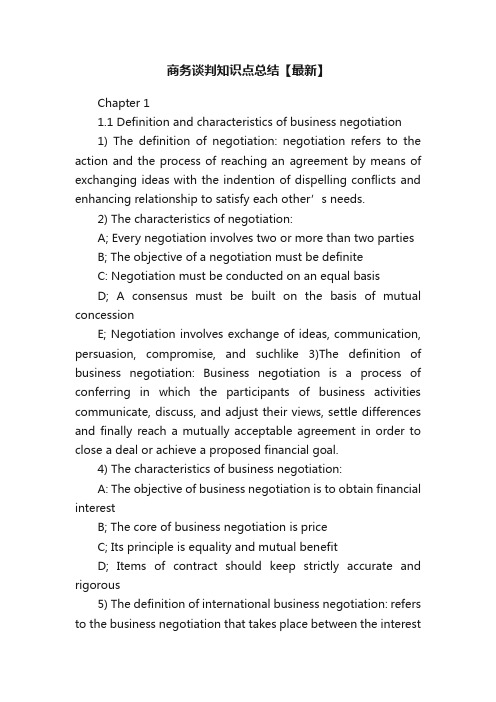
商务谈判知识点总结【最新】Chapter 11.1 Definition and characteristics of business negotiation1) The definition of negotiation: negotiation refers to the action and the process of reaching an agreement by means of exchanging ideas with the indention of dispelling conflicts and enhancing relationship to satisfy each other’s needs.2) The characteristics of negotiation:A; Every negotiation involves two or more than two parties B; The objective of a negotiation must be definiteC: Negotiation must be conducted on an equal basisD; A consensus must be built on the basis of mutual concessionE; Negotiation involves exchange of ideas, communication, persuasion, compromise, and suchlike 3)The definition of business negotiation: Business negotiation is a process of conferring in which the participants of business activities communicate, discuss, and adjust their views, settle differences and finally reach a mutually acceptable agreement in order to close a deal or achieve a proposed financial goal.4) The characteristics of business negotiation:A: The objective of business negotiation is to obtain financial interestB; The core of business negotiation is priceC; Its principle is equality and mutual benefitD; Items of contract should keep strictly accurate and rigorous5) The definition of international business negotiation: refers to the business negotiation that takes place between the interestgroups from different countries or regions.6) The additional characteristics of international business negotiation:A; Language barrier;B; cultural differences;C; international laws and domestic laws are both in force;D; international political factors must be taken into account;E; the difficulty and the cost are greater than that of domestic business negotiationsChapter 2principles of business negotiation2.1equal and voluntary participation1) All parties , big or small ,should be equal2) veto power embodies equality (否决权体现平等)4) voluntary agreement embodies equality3) respect embodies equality2.3 mutual reciprocity and mutual benefits2.2 credibility first2.4 maximizing commonalities and minimizing differences2.5 speaking on good grounds2.6 separate the people from the problem1.see the situation from the other side’s point of view2.present more objective information and avoid blaming the other side3.react tactfully(委婉地) to emotional outbursts(爆发)4.help them save face and do not hurt them emotionallyChapter 3preparation for business negotiation3.1 collecting informationWhere to collect information1)International organizations.3) Service organizations2) Governments.4) Directories and newsletters.5)On-line service.3.2 forming the negotiation teamGenerally speaking , the size of a negotiation team depends on :A: THE number of the negotiation team members of your counterpartB: the complexity of the negotiationC: THE need for technical expertsD: the number of the associates in the projectBill Scott suggests that the number is probably four. The main reasons for this number include:● Size of group.● Control of team.● Range of expertise.● Changing membership.3.3 planning for business negotiation1) Gist of a negotiation plan:Requirement toward :the key points of the negotiationthe thoughtfulness and flexibility of the planthe predictability of the planthe negotiation timethe negotiation atmosphereKey points while making the negotiation agendaNegotiation site-Negotiation issuesOpen agenda and restricted agenda4)negotiation agendaNegotiation agenda refers to the arrangement for the timing and site choice of the negotiation, and issues discussed.1.Scheduling of the negotiation-2.Negotiation site-3.Key points while making the negotiation agenda4.Open agenda and restricted agenda5.Negotiation issues3.4 physical preparations3.5 simulated negotiationsChapter 4Opening of Business Negotiation4.1.1 Different negotiation atmospheres have different impacts on the negotiation:1) positive and friendly2) tense and contradictory3) Brief and straightforward4) dilatory and protracted( 缓慢,拖拉的)5) cold and perfunctory( 漫不经心的)6)sedate and reserved(平静,冷淡的)4.3 opening strategies1) resonant openingConferring approach: we ask for the opinions of the other party with a kind tone to boost discussion toward our goals ,then approve of their proposals and are willing to follow their proposals to proceed with our work.Inquiring approach: to design your answer in the form of a question to induce your counterpart to move toward the goal that you have set.Complementing approach: encourage you to avail yourselfof the opportunity to add your own opinions to that of the other party and talk them around to your way of thinking and let them speak in your voice.2) frank opening3) evasive opening4) nitpicking opening5) offensive openingRefers to the way in which we express our firm attitude through well prepared speech or bahavior so as to gain the awe from the rival and force them to start the negotiation in accordance with or intention.Ch5Bargaining ProcessGenerally speaking ,there are four modules of business negotiation for reaching an agreement: Enquiry and reply, Offer and counter-offer,Acceptance, and conclusion of a contract!5.1 Enquiry and reply1. The form of enquiry2. Guidelines for making enquiries3. Guidelines for replying enquiries professionally4. Ways of saying “no”Chapter 6Negotiation strategies and tactics6.1 Developing your strategy(稍微看看)What are the major negotiation strategies of manaing conflict?Collaborating----”win-win” approachCompromising----”mini-win-and mini-lo se”Accommodating----”lose-win”Controlling----power oriented approachAvoiding----leave or “lose-win”Controlling is best when:Quick, decisive action is vitalAn important issue requires unpopular actionYou know you are rightThe other party would take advantage of co-operative behavior Collaborating is best when:The issues are too important to be compromisedThe objective is to integrate different points of viewYou need commitment to make the solution workYou wish to build or maintain an important relationshipAvoiding is best when:The issues are not importantThere are more pressing issues to tackleThere is no chance of achieving your objectivesThe potential “aggravation”of negotiating outweighs the benefitsPeople need to cool down and regain their perspectiveAccommodating is best when:You find out that your are wrongYou wish to be seen as reasonableYou wish to build “credits”for later issuesThe issues are more important to the other partyYou wish to minimize loss when you are in a weak position Harmony and stability are more importantCompromising is best when:issues are important but you cannot afford to be too controllingThe relationship Is important but you cannot arrord toaccommodate Opponents of equal power are committed to mutually exclusive goalsYou need to achieve temporary settlements to complex issuesYou need to fine an expedient solution under time pressure It is the only alternative to no solution6.2 Strategic considerationsThe repeatability of a negotiation----a repeat deal or not?If it is likely to be a repeat business, then cooperating can be a good option . The strengths of negotiating parties---- are you powerful or not?The importance of a deal----an important deal or not?The time scale----urgent or not?The negotiation resources----abundant negotiation resources or not?6.3 Useful negotiation strategies and tactics1."When" strategy(1) Forbearance(3) Fait accompli(2) Surprise(4) Bland withdrawal(6) Limits(5) Reversal 2."How" strategy(1) Feinting(2) Release and catch。
- 1、下载文档前请自行甄别文档内容的完整性,平台不提供额外的编辑、内容补充、找答案等附加服务。
- 2、"仅部分预览"的文档,不可在线预览部分如存在完整性等问题,可反馈申请退款(可完整预览的文档不适用该条件!)。
- 3、如文档侵犯您的权益,请联系客服反馈,我们会尽快为您处理(人工客服工作时间:9:00-18:30)。
重点:1)What is Negotiation“Negotiation”means “doing business”or a discussion aimed at reaching an agreement.Four main phases of negotiation:The preparing phase (预备阶段)The debating phase (争论阶段)The proposal phase (建议阶段)The bargaining phase(讨价还价阶段)或者是Pre-NegotiationFace-to-Face Negotiation ( At the Negotiation )Post-NegotiationWhat is business negotiationBusiness Negotiation is a kind of discussion aimed at reaching a business agreement or abusiness contract.Four stages in business negotiationnon-task sounding (开局前的试探)task-related exchange of information (交换与谈判目标有关的信息)persuasion (说服)concessions and agreements (让步与同意)3)Some Issues that Chinese Corporations and Negotiators Need to AddressChinese businessmen tend to have business negotiations in a rather indirect manner, as opposed to the direct manner of American businessmen.The decision-making process of Chinese companies is generally both slow and time-consuming. On the other hand, American companies usually operate with quick decision made by the top management.Different Business Communication Styles between China and the USAManner: Direct Manner / Indirect MannerDecision-Making: Quick, Top-Down / Slow, Tine-ConsumingWork Ethic: Individual Oriented / Social PressureValue Results more than its Process / Community Belonging, Priority to Planning Merits: Efficiency / Encourage CooperationCompetition in Workers / more HumaneDemerits: Frustrating Workers / Lack of Efficiency and Competition4)China’s Foreign Trade PolicyThe principle of China’s foreign trade is “equality, mutual benefit and exchanging what onehas for what one needs”.(平等互利,互通有无)5)An Introduction to the Five Links of International Business NegotiationEnquiry (询盘)Offer (发盘)Counter-Offer (还盘)Acceptance (接受)Conclusion of a Contract(缔结合同)Of course, it is not necessary to have all the five links taken for every transaction. Sometimes, only offer and acceptance will do. It is stipulated in the laws of some countries that only offer andacceptance are the two required factors, failure of which will make no contract.Brief Introduction to Incoterms®2010Incoterms are used in international import/export contract to show the responsibility of the buyers and the sellers. They define who is responsible for “freight”or “carriage”(transportation) , insurance against risks, “duty”(tariff) and “clearance”(import and export documentation).The word “INCOTERMS”is short for International Rules for the Interpretation of Trade Terms, and most frequently used in international sales transactions.The latest version is INCOTERMS ® 2010, which already became effective on Jan. 1st 2011. Previous versions, including INCOTERMS 2000, are now outdatedThe ® sign means a registered trade mark, it became a necessary part of Incoterms ®2010 International Tender or Bid 国际性招投标Concepts Related Tender or Bid onTender 投标(British English)Bid 投标(American English)submit a tender / bid(submission of tender / bid)投标Tenderer or bidder 投标者Winning bidder / successful tenderer 中标者To invite tender / bid 招标Invitation for (to) tender / Bids 招标Tenderee / the bid inviting party 招标人/ 招标方Generally speaking, people often using tendering / bidding to refer to invite tender / bid and tender / bid.Tendering / Bidding 招投标International tendering / international bidding 国际招投标Submission of Tender (投标)Tenders’/ Bidders’behaviors to deliver their bid / tenders forms to the tenderee according to the conditions of the Tender notice within the specified period of time.投标人根据招标公告或招标单规定的条件,在指定的时间内向招标人递盘的行为。
Legally, the tender / bid is an offer, which is equivalent to the offer in international trade negotiation.在法律上投标属于要约,相当于国际贸易谈判中的发盘。
General Procedures of Bidding 招标基本程序Preparation of Bidding Documents编制招标文件或标书Publicizing the Invitation for Bids发布招标邀请书Preparation of Bids编制投标书Submission of Bids递送投标书Opening and Evaluation of Bids开标与评标Award决标8)Definition of International Investment 国际投资的定义The international investment is a form of the cross-border flows of International Monetary Capital and International Industrial Capital. It is a kind of economic activities to invest the monetary capital from a country or region to another country or region in order to realize the value increment.国际投资是国际货币资本及国际产业资本跨国流动的一种形式,是将资本从一个国家或地区投向另一国家或地区以实现价值增值的经济活动。
国际投资可以看成一般投资在国际上的扩展。
它既具有一般投资的特征,又有其国际性的特殊性。
International Direct Investment and International Indirect Investment 按照投资主体是否拥有对海外企业的实际经营管理权,分为:1) International Direct Investment (国际直接投资)国际直接投资,又称为对外直接投资(FDI)、境外直接投资、外国直接投资或海外直接投资,指投资者到国外直接开办工矿企业或经营其他企业,即将其资本直接投放到生产经营中以获取长期利益的经济活动,其特征在于:投资者能够对企业的经营管理拥有有效的控制。
